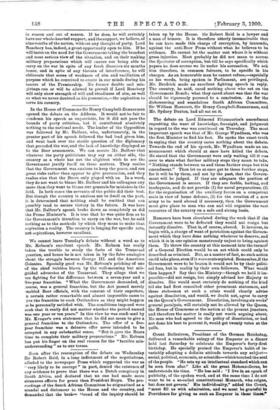Soon after the resumption of the debate on Wednesday Sir
Robert Reid, in a long indictment of the negotiations, alluded to the newspaper Press which supported the war as " very likely to be corrupt " in part, denied the existence of any evidence to prove that there was a Dutch conspiracy in South Africa, and declared that no one had made more strenuous efforts for peace than President Steyn. The pro- ceedings of the South African Committee he stigmatised as a scandal and dishonour to the House and the country, and demanded that the broken thread of the inquiry should be taken np by the House. Sir Robert Reid is a lawyer and a man of honour. It is therefore utterly inconceivable that he can have made this charge of corruption, by innuendo, against the anti-Boer Press without what he believes to be evidence. He cannot let the matter rest where it is without gross injustice. Most probably he did not mean to accuse the Spectator of corruption, but till he says specifically which papers he does accuse we lie under his accusation. We ask him therefore, in common fairness, to be specific in his charges. As an honourable man he cannot refuse,—especially as his words, being spoken in Parliament, are privileged, Mr. Brodrick made an excellent fighting speech in reply. The country, he said, cared nothing about who sat on the Government Bench ; what they cared about was that the war should be vigorously pursued to a conclusion. As for the dishonouring and scandalous South African Committee, Sir William Harcourt, Sir Henry Campbell-Bannerman, and Mr. Sydney Buxton, had all eat on it.






































 Previous page
Previous page